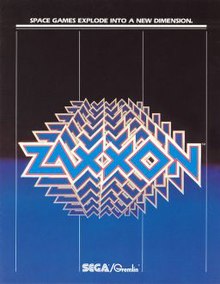| Zaxxon | |
|---|---|
 North American arcade flyer | |
| Developer(s) | Sega Ikegami Tsushinki[1] |
| Publisher(s) |
|
| Series | Zaxxon |
| Platform(s) | Arcade, ColecoVision, Coleco Adam, Commodore 64, MSX, Atari 2600, Atari 8-bit, SG-1000, Apple II, Intellivision, IBM PC, TRS-80, TRS-80 Color Computer, ZX Spectrum |
| Release | |
| Genre(s) | Scrolling shooter |
| Mode(s) | 1–2 players alternating turns |
| Arcade system | Sega Zaxxon |
Zaxxon[a] is a scrolling shooter developed and released by Sega as an arcade video game in 1982.[5] The player pilots a ship through heavily defended space fortresses. Japanese electronics company Ikegami Tsushinki was also involved in the game's development.[5][1]
Zaxxon was the first game to employ axonometric projection, which lent its name to the game (AXXON from AXONometric projection). The type of axonometric projection is isometric projection: this effect simulates three dimensions from a third-person viewpoint. It was also the first arcade game to be advertised on television,[6] with a commercial produced by Paramount Pictures for $150,000.[7] The game was a critical and commercial success upon release, becoming one of the top five highest-grossing arcade games of 1982 in the United States.
Sega released a modified version as, Super Zaxxon the same year and the Zaxxon-like shooter Future Spy in 1984.
- ^ a b c Akagi, Masumi (13 October 2006). アーケードTVゲームリスト国内•海外編(1971–2005) [Arcade TV Game List: Domestic • Overseas Edition (1971–2005)] (in Japanese). Japan: Amusement News Agency. p. 131. ISBN 978-4990251215.
- ^ Akagi, Masumi (13 October 2006). アーケードTVゲームリスト国内•海外編(1971–2005) [Arcade TV Game List: Domestic • Overseas Edition (1971–2005)] (in Japanese). Japan: Amusement News Agency. p. 77. ISBN 978-4990251215.
- ^ Cite error: The named reference
CVG10was invoked but never defined (see the help page). - ^ "Video Game Flyers: Zaxxon (France)". The Arcade Flyer Archive. Retrieved 7 April 2021.
- ^ a b It started from Pong (それは『ポン』から始まった : アーケードTVゲームの成り立ち, sore wa pon kara hajimatta: ākēdo terebi gēmu no naritachi), Masumi Akagi (赤木真澄, Akagi Masumi), Amusement Tsūshinsha (アミューズメント通信社, Amyūzumento Tsūshinsha), 2005, ISBN 4-9902512-0-2.
- ^ Mark J. P. Wolf (2008), The video game explosion: a history from PONG to Playstation and beyond Archived 2018-04-14 at the Wayback Machine, p. xviii, ABC-CLIO, ISBN 0-313-33868-X
- ^ Harmetz, Aljean (July 3, 1982). "Movie Themes Come To Video Games". Star-News. Retrieved 28 February 2012.
Cite error: There are <ref group=lower-alpha> tags or {{efn}} templates on this page, but the references will not show without a {{reflist|group=lower-alpha}} template or {{notelist}} template (see the help page).